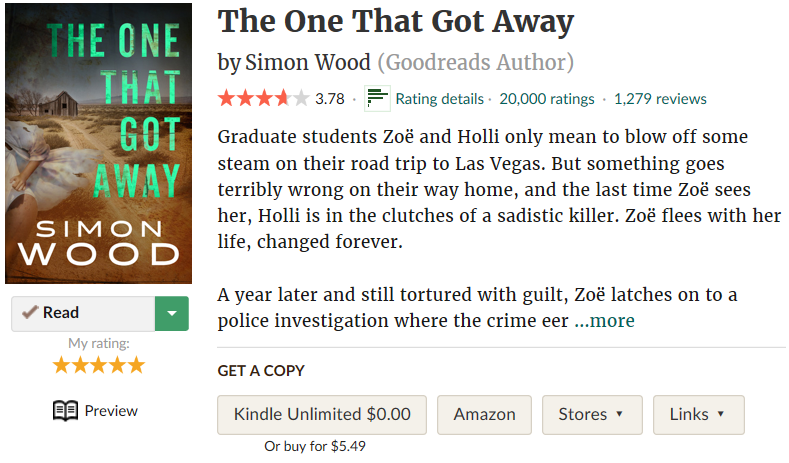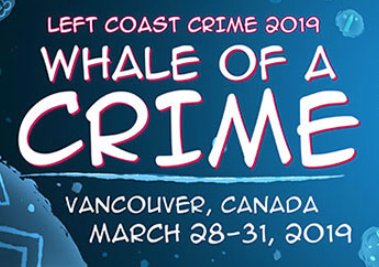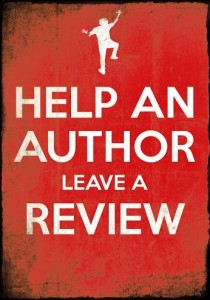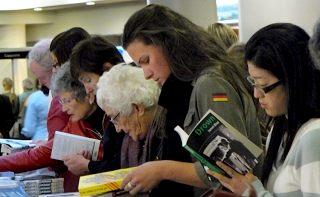This book trailer for PAYING THE PIPER was put together by someone who enjoyed the book. I like she used various images from the various editions of the book. I think it’s quite dramatic and effective. I hope you like it.
Categories: Uncategorized
This book trailer for PAYING THE PIPER was put together by someone who enjoyed the book. I like she used various images from the various editions of the book. I think it’s quite dramatic and effective. I hope you like it.
Categories: Uncategorized
MILESTONE: My thriller THE ONE THAT GOT AWAY now has 20,000 ratings on GoodReads. Thanks to everyone who read it and more importantly to those who took the time to rate it.

Categories: Uncategorized
 I’m going to be at this year’s Left Coast Crime convention held in Vancouver, British Columbia, Canada!! This is my appearance schedule.
I’m going to be at this year’s Left Coast Crime convention held in Vancouver, British Columbia, Canada!! This is my appearance schedule.
Bar Stories aka The Not So Secret Life of Authors
With David Corbett, Robin Burcell, David Schlosser, Tim Hallinan, Catriona McPherson and with me emceeing
Friday, March 29th, 6:15pm-7:00pm
Four Dyslexics & an Aphantasiac Talk Writing
With Jamie Mason, Josh Stalling, Jay Stringer and me with Jacque Ben-Zekry moderating.
Saturday, March 30th, 5:15pm-6:00pm
If you’re coming, I do hope you’ll drop by and say hi.
Categories: Uncategorized
 I don’t think readers don’t know the power they wield and how it can help their favorite writers. Here are five simple things readers can do to help any writer.
I don’t think readers don’t know the power they wield and how it can help their favorite writers. Here are five simple things readers can do to help any writer.
1. The first rule is Buy a Book. I know it’s a given, but if you want to keep your favorite writers in business, you have to buy a book.
2. The second rule is to borrow a book from the public library (and I bet you thought I was going with the buy a book thing again). Library book sales are good for the writer. They provide a backbone of sales that can make or break a writer’s next contract. Even if you’ve bought the book, still go and borrow it from the library and if the library doesn’t have it, request it. This helps not only the writer, but also the libraries. Increased demand ensures libraries stay open.
3. The third rule of reader’s club is to write a review. It doesn’t have to be an in-depth critical analysis or high school book report. Just a few sentences giving a title the thumb’s up is good, then put it up on Amazon, Barnesandnoble.com, etc. Share your thoughts on sites like Goodreads.com and Shelfari. Goodreads lets you recommend your favorite books to your fellow readers. Public opinion really carries weight and the information on these sites get used by other sites.
4. The fourth rule is to tell a friend. Word of mouth is gold. If you like a writer or a book, tell someone about it. It’s not a national secret.
5. The fifth and final rule is to buy another book. Don’t be one those people who say “yeah, I read a book once.” It won’t hurt to do it again and writers will thank you for it.
We all need our stories and without storytellers, we can’t have our stories. And don’t forget, if you’re going to start with someone, start with me. 🙂
Categories: shelf life
 I don’t like discussing how many books I’ve sold. It’s boastful. I’m English. As a people, we don’t boast. But in the quieter moments of my day (usually around royalty statement time) I will tot up how many books I’ve sold. Not to boast (see the English thing), it’s quite a few nowadays. Not as many as I would like, but a lot better than I ever imagined. However, I find it hard picturing my readers. Say a thousand people buy a book of mine. By publishing standards, that’s not a lot, but you wouldn’t want to wait in line behind them for the toilet. So when it comes to things like this, you need a bit of perspective.
I don’t like discussing how many books I’ve sold. It’s boastful. I’m English. As a people, we don’t boast. But in the quieter moments of my day (usually around royalty statement time) I will tot up how many books I’ve sold. Not to boast (see the English thing), it’s quite a few nowadays. Not as many as I would like, but a lot better than I ever imagined. However, I find it hard picturing my readers. Say a thousand people buy a book of mine. By publishing standards, that’s not a lot, but you wouldn’t want to wait in line behind them for the toilet. So when it comes to things like this, you need a bit of perspective.
Ten years ago or so when my first book came out, I came up with a way of quantifying the number of people who bought my book. I chose NFL stadiums. The average NFL stadium runs what—80-100,000 seats? I liked to picture all my readers entering the stadium with a copy of my book under their arm. Yes, ambitious, but it gives some nice context. Unfortunately, sales for my first book wouldn’t have filled one section. Kinda sad, but I had a true sense of the physical size of my readership.
 I’m happy to say that’s changed. In the last few years (and I do mean few), I’ve found a readership. Since 2011, my readers are just taking their seats in their twelfth stadium.
I’m happy to say that’s changed. In the last few years (and I do mean few), I’ve found a readership. Since 2011, my readers are just taking their seats in their twelfth stadium.
Can I be frank for a second? I can. Thanks. HOLY SHIT!!! That’s a bugger load of people. And even more frightening, that’s a bugger load of people I don’t know. There was a point when I knew every one of my readers. Not now. That’s an awesome feeling, but it also puts me in a cold sweat.
Excuse me, I have to leave the room for a second…
…Okay, I’m back. What was I talking about? Yes, readers.
I guess I’m a little freaked out because this has gotten bigger than I ever imagined and by the same token, this is serious business now. Writing is no longer a trivial pursuit. People expect a good book and I have to do my best to make that happen. It’s a little disconcerting to wrap my head around that.
Okay, time for a little more perspective; I’m nowhere near bestselling standards. Stephen King, Dean Koontz and John Grisham have each sold hundreds of millions of copies. That’s whole nations of people possessing their books. Now, that’s impressive.
But for me, I am, hand on heart, blown away by how many people have bought my books over the years. I’m grateful to every single one of you—and I promise to do my best to entertain you with each book and story to come. And for those who haven’t bought a book, try one. There’s a seat waiting for you in a stadium in my mind. 😀
Categories: shelf life
 So THE ONE THAT GOT AWAY has been out for a month (two if you’re an Amazon Prime Member) and reader feedback has been coming in. Quite a lot of it actually. On Amazon.com, the book has racked up almost 2,000 reviews so far. This is understandable as TOTGA (as the cool kids aka my editor calls it) is by far my fastest and bestselling book so far. Phew! I may be in publishing for a little while longer.
So THE ONE THAT GOT AWAY has been out for a month (two if you’re an Amazon Prime Member) and reader feedback has been coming in. Quite a lot of it actually. On Amazon.com, the book has racked up almost 2,000 reviews so far. This is understandable as TOTGA (as the cool kids aka my editor calls it) is by far my fastest and bestselling book so far. Phew! I may be in publishing for a little while longer.
But a lot more readers mean a lot more opinions. Luckily for me, people more often than not like TOTGA. Thank God for that. I was a little worried about reader feedback because there’d be a lot more people reading out of genre. More exposure is nice…as long as everyone is of the same opinion and a positive opinion at that. Well, it looks as if it is so.
Actually I’m quite pleased about TOTGA’s reception. People, by and large, got it. They embraced Zoë Sutton warts and all. I wasn’t sure readers would, considering she is someone suffering from PTSD, which makes her a little difficult to like or understand at times.
But with every book, I get feedback that I wasn’t quite expecting. So here are a few findings:
When a book meets the public, it’s exciting and daunting because it’s an interpretive voyage of discovery…and the discovery will continue as the book continues to travel.
Categories: book of the month shelf life

Categories: shelf life

I don’t readers don’t know the power they wield and how it can help their favorite writers. Here are five simple things readers can do to help any writer.
1. The first rule is Buy a Book. I know it’s a given, but if you want to keep your favorite writers in business, you have to buy a book.
2. The second rule is to borrow a book from the public library (and I bet you thought I was going with the buy a book thing again). Library book sales are good for the writer. They provide a backbone of sales that can make or break a writer’s next contract. Even if you’ve bought the book, still go and borrow it from the library and if the library doesn’t have it, request it. This helps not only the writer, but also the libraries. Increased demand ensures libraries stay open.
3. The third rule of reader’s club is to write a review. It doesn’t have to be an in-depth critical analysis or high school book report. Just a few sentences giving a title the thumb’s up is good, then put it up on Amazon, Barnesandnoble.com, etc. Share your thoughts on sites like Goodreads.com and Shelfari. Goodreads lets you recommend your favorite books to your fellow readers. Public opinion really carries weight and the information on these sites get used by other sites.
4. The fourth rule is to tell a friend. Word of mouth is gold. If you like a writer or a book, tell someone about it. It’s not a national secret.
5. The fifth and final rule is to buy another book. Don’t be one those people who say “yeah, I read a book once.” It won’t hurt to do it again and writers will thank you for it.
We all need our stories and without storytellers, we can’t have our stories. And don’t forget, if you’re going to start with someone, start with me. 🙂
Categories: shelf life